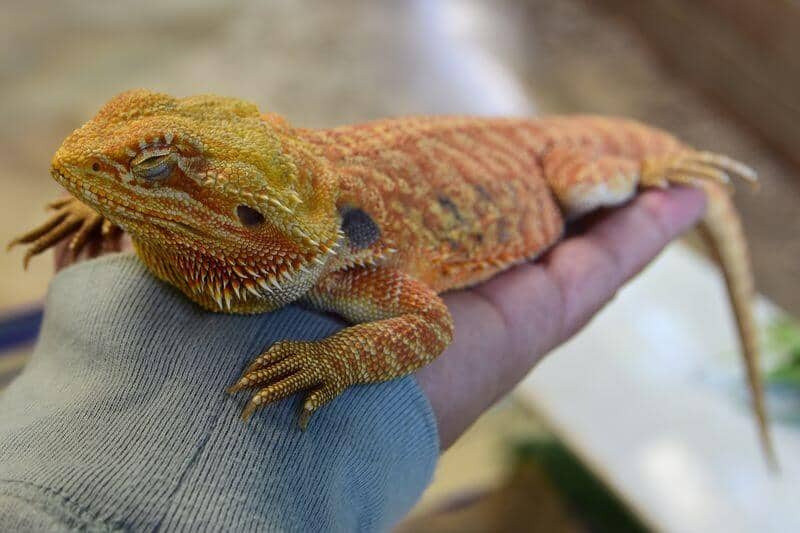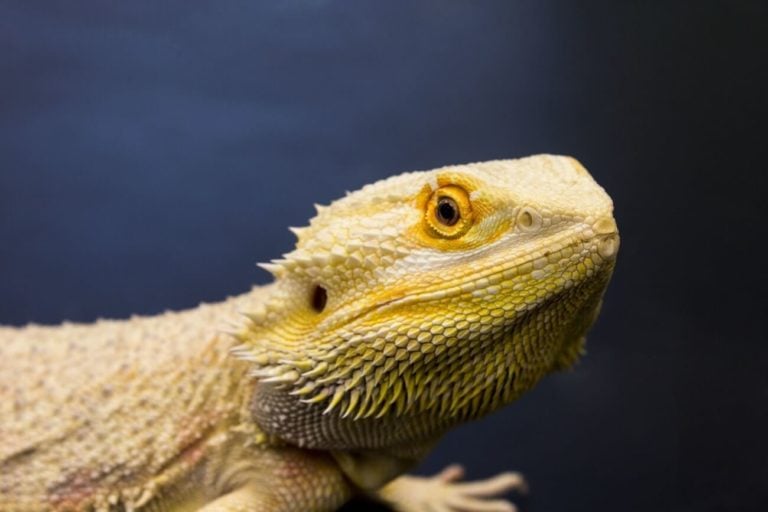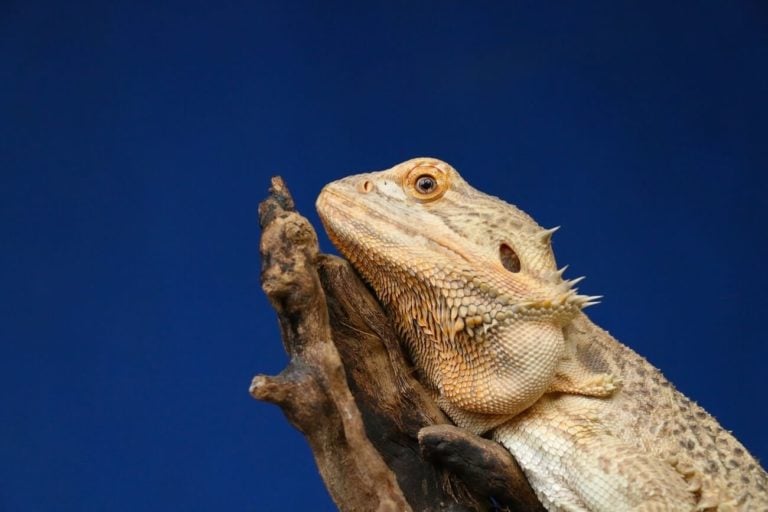A bearded dragon with closed eyes might look cute, but there are often some potentially concerning reasons for this behavior. Despite this, many owners misunderstand what this sign actually means.
This guide will teach you why bearded dragons close their eyes, and what you should do about it (when necessary).
Table of Contents
Why Bearded Dragons Close Their Eyes When Being Pet Or Held
To say that bearded dragons are an enigma would be an understatement. These creatures don’t wear their emotions in the same way that cats or dogs do. They spend most of their days basking and rarely do anything that helps you understand what they’re thinking.
Of course, there are some obvious signs of excitement or aggression. Most owners know to back off when that signature beard puffs up alongside audible hisses. But what about more subtle behaviors?
Take, for example, closing their eyes. When many bearded dragon owners see their lizard closing its eyes when stroked or held, they assume it’s because the reptile is happy. Unfortunately, that’s not the case, and this behavior is often misunderstood.
This Behavior In The Wild
To better understand where your bearded dragon’s head is when it closes its eyes, you have to think about the behavior’s significance in the wild.
In nature, animals use eye contact to scope out prey. Large predators stalk their meals with great intensity and use prolonged eye contact to keep those prey animals in their sight. The same goes for your bearded dragon.
Think about how they consume the live insects you provide. They likely watch those critters intently before making a move and chowing down.

Eye contact shares an intrinsic link with predatory behavior. To bearded dragons, prolonged stares are nothing more than threats.
So what does that mean in relation to close-eyed pets and handling?
While a dog might close its eyes to relax when you get into the groove of pets and belly rubs, bearded dragons use the behavior differently. It’s not to express contentment or happiness. It’s usually to show discomfort!
Believe it or not, bearded dragons typically close their eyes when you pet or hold them because they’re scared and want to get out of the situation. It’s a coping mechanism and often acts as a warning to back off. If you don’t, their behavior could progress to more aggressive actions.
As a whole, bearded dragons can be hit or miss regarding physical contact with humans. Some lizards will grow accustomed to their owners, learning to enjoy head pets and occasional handling. However, some don’t.
If your bearded dragon is new or hasn’t received much exposure to human contact, it might see your hand as nothing more than a fearful predator. Your gentle touch is uncomfortable for the lizard, and its closed eyes signify that they want you to stop!
This reaction can occur at any time. It’s more common with new bearded dragons, juveniles that aren’t used to interacting with humans, or lizards that haven’t had much experience with handling. However, even bearded dragons that have been with their owners for years might occasionally close their eyes when they’re not feeling particularly sociable.
What This Means For You
As disheartening as this might be, don’t be discouraged! Bearded dragons are surprisingly complex creatures. They have their bad days, and some are more personable than others. Ultimately, whether or not a bearded dragon closes their eyes or enjoys your touch depends on personal preference and timing.
You can’t expect every lizard to enjoy being held, and it’s unrealistic to expect them to tolerate constant human contact. These animals need their space, and closing their eyes is just one way to express that need.
If your bearded dragon closes its eyes and attempts to move away from your hand when you reach in, take the hint. Your beardie doesn’t want you to handle them at the moment. If you manage to get your hands on them, they’ll likely freeze up, close their eyes, and wait for you to stop.
Unfortunately, many bearded dragon owners assume that the closed-eye stance means that their lizard is happy or drifting off to sleep. So, they keep petting! Some beardies will not take kindly to the continued dismissal of their discomfort.
It’s always important to keep an eye on your beardie’s behavior. If the petting doesn’t stop, those closed eyes can turn into flared beards, audible hisses, tail whipping, and other signs of aggression to get away from you. When you pet your beardie, it usually has ways to escape your grasp and find cover.
But that’s not the case when you hold them. If your bearded dragon closes its eyes while it’s in your hands, it’s feeling more than discomfort. It might be dealing with feelings of outright fear.
When held, bearded dragons sometimes feel that they can’t escape your grasp. As a result, mild discomfort can quickly elevate to automatic fight-or-flight responses. It’s common for dragons to try and leap away from owners when held, resulting in dangerous falls and possible injuries. If they don’t do that, they might even attempt to bite you and escape your grip.
Despite the general calm demeanor that washes over your bearded dragon, seeing it with its eyes closed is not good when you’re petting or holding it. Take it as a sign that your beardie is not in the mood to play. It’s uncomfortable, and the best thing you can do is give it the space it needs.
Other Causes For Closed Eyes
Generally, your bearded dragon closes its eyes because it’s uncomfortable and possibly scared. But that’s not the only reason why this out-of-character behavioral quirk may occur.
Here are a few other reasons you might see your bearded dragon with closed eyes.
Infection
Eye infections are more common than owners realize. Like any other captive reptile, the bearded dragon needs a fine-tuned habitat with the right humidity levels, temperature, and lighting. When things aren’t perfect, these lizards can experience a wide range of health issues.
Infections are just one possible result. Bearded dragons can also get infections due to the bacteria that accumulate in a filthy enclosure, dust that floats through the air, and more.
When infections occur, the delicate tissue of the eye can become compromised. These lizards often experience swelling, intense pain, discharge, and more.
Expert Tip: The easiest way to determine if a bearded dragon has an eye infection is to pay attention to how often they close their eye. When infections are to blame, your beardie will close its eyes beyond petting sessions and handling. They’ll likely keep those eyelids shut for a long time.
It’s the lizard’s way of protecting the tissue. You may also see pus, head swelling, and other telltale signs of health troubles. When you do, take your bearded dragon to a vet as soon as possible for treatment.
Dehydration
Another possible cause for a bearded dragon closing its eyes is dehydration. These reptiles can lap up water from a bowl, but most prefer to get water through the foods they eat. If your lizard isn’t getting enough hydration for whatever reason, it’ll show.
The eyes begin to look sunken as your beardie keeps them closed to preserve moisture. Your lizard may also exhibit signs of weakness or lethargy. It’s common to see thicker saliva, digestive issues, chronic lip-licking, and more.
If you think dehydration is to blame, you must take action. Invest in a water dispenser, provide high-moisture snacks, and simulate water movement to encourage your bearded dragon to take a drink.
Mites
Mites and other parasitic insects can take over a poorly maintained enclosure. The conditions in your bearded dragon’s tank are perfect for those tiny invaders, and they’ll take full advantage when allowed to proliferate.
The problem with mites is that they prefer to target soft tissue. Your beardie’s eyes are palatable to these parasites and can cause many health problems. When mites move in, they attack the eyes, forcing your bearded dragon to close them in pain and discomfort.
Expert Tip: Consult with your vet to treat mite infections. Then, take steps to clean and sanitize the enclosure. Keeping the habitat in good shape moving forward will help keep mite and bacteria populations at bay.
Shedding Issues Around The Eye
Shedding is something that bearded dragons do every few months. When conditions are right, this process usually goes off without a hitch. But sometimes, small slivers of skin can stubbornly stick around and cause problems around tricky areas.
That includes the eyes.
The dried skin can cause your bearded dragon to close its eye due to the pain. Don’t ignore the problem. Even the smallest piece of leftover skin can cause injuries and eventual infection.
The best thing you can do is maintain proper humidity levels and give your bearded dragon a nice bath. You can also use a damp cotton swab to gently loosen those stubborn pieces, providing much-needed relief.
Is This Behavior Different For Baby Bearded Dragons?
You might assume that baby bearded dragons don’t have the same concerns about human interaction that adults do. However, you’d be wrong!
Baby beardies can close their eyes when pet or handled for the same reason as adults. In fact, you’re actually more likely to see them close their eyes when they’re young.
Babies don’t have much experience with anything. They’re naturally fearful of their surroundings and can experience more stress than adults. Many will grow up with proper socialization and learn to love being handled by owners.
But that exposure and bond don’t exist when they’re still young. As a result, they tend to be more scared than their adult counterparts. In addition to seeing them close their eyes, you might notice that babies try to wriggle out of your hands more often.
Expert Tip: Don’t let that prevent you from bonding with a baby bearded dragon. While it’s important to give space when needed, you also must take steps to socialize and build trust. With time, your young beardie will grow up and keep their eyes open when you pet and hold them.
What Does It Mean When They Only Close One Eye?
Despite how it looks, your bearded dragon isn’t winking at you. In most cases, seeing one eye closed isn’t a response to your touch or any external stimuli. It’s typically caused by injury or illness.
Bacterial infections and parasites often affect one eye first. Some reptiles are unlucky enough to experience problems with both eyes, but that usually comes later.
The same goes for foreign objects or abrasive skin from shedding issues. Those injuries occur in one eye, causing your bearded dragon to keep it closed while relying on the healthy eye to see.
If you see your bearded dragon only closing one eye, do a quick visual inspection. You may notice swelling, discharge, or discolored tissue in the affected eye. Bring your beardie to a vet for proper treatment as soon as you can to avoid any further complications.
Conclusion
A bearded dragon with closed eyes should be a sign that you need to back off on handling them for a bit, or investigate to see if another issue is to blame. By simply knowing what to look for, you can use this as a way to keep your beardie happy and healthy!
We’re always happy to hear from our readers, so feel free to send us a message if you have questions about this guide (or anything else)!


